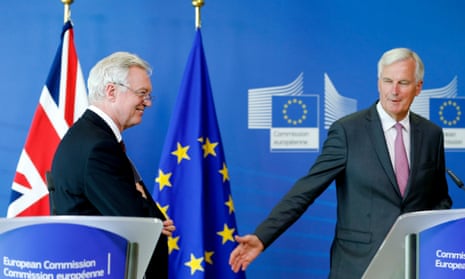The EU has rejected Britain’s calls for a more “flexible” approach to Brexit talks, amid growing signs of deadlock over the divorce bill.
In a sign of mounting frustration, Michel Barnier, the EU’s chief negotiator, suggested that Brexit talks were being held up by the UK’s decision not to publish a position paper on the financial settlement.
“To be flexible you need two points, our point and their point,” Barnier told reporters on the sidelines of the ongoing talks in Brussels. “We need to know their position and then I can be flexible.”
He rejected the UK’s repeated calls to merge discussions on divorce issues, such as on money and the Irish border, with talks about the future relationship. “The EU’s guidelines were designed for ‘serious and constructive negotiations’,” he tweeted. “We need clear UK positions on all issues.”
The criticism contradicted Theresa May’s claims that it was the UK providing clarity on Brexit. “It is the United Kingdom that has been coming forward with the ideas and with the clarity about the future,” the prime minister said on Wednesday while on a visit to Japan.
During the latest round of talks, the UK is refusing to explain what it sees as its debts to the EU, although the Brexit secretary, David Davis, has acknowledged there are “survivable obligations”.
Davis returned to Brussels on Wednesday afternoon, before a closing session with Barnier on Thursday.
The British government has decided not to publish a position paper on the Brexit financial settlement, an aspect of Davis’s “constructive ambiguity” approach that has infuriated EU politicians.
Guy Verhofstadt, the European parliament’s Brexit coordinator, told MEPs on Wednesday that securing a divorce deal by October looked unlikely, amid slow progress.
“If it goes very slow, as is the case at the moment, it will be very difficult to say there is sufficient progress when we are in October,” he said. Verhofstadt blamed the slow progression on a lack of clarity from the UK.
“That has to do with the fact naturally that we need from both sides the position papers on every issue, before you can really start the negotiation. If only one party around the table is putting a position and the other party is not responding then it is difficult to start a negotiation,” he said.
However, Verhofstadt said he saw signs of change in the UK, such as greater recognition that no deal is the worst possible outcome.
The British also showed greater understanding of the need for a transition period, he said, which he predicted would replicate the status quo.
“[There] is now more and more recognition of the need of such a transition period. What will be the substance of this transition deal? That has to be discussed I think that the more and more time we lose in the coming months, the more and more it is clear that the transition period can only be the prolongation of the existing situation, of the status quo.”
The government argues that it can get a “bespoke” transition deal that would allow a new customs arrangement from March 2019, although Labour has said this is not possible.
Verhofstadt also said he had received thousands of letters from worried citizens, both British nationals on the continent and EU citizens in the UK. In some member states, citizens were already being made to feel as if they were foreigners, he said.
He cited the “most awful” example as when the Home Office sent a letter in error to 100 EU nationals telling them they would be deported from the UK.
